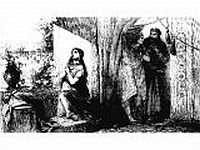 |
||
Responding to Domestic Violence: Guidelines for Pastors and RabbisWhere domestic abuse is an issues, victims will often approach their spiritual leaders for guidance. Responding to domestic violence in the 'right' way, ie one which is spiritually sound and envalidating to the victim is of utmost importance. The following guidelines for pastors and rabbis has been drawn up by the Center for the Prevention of Sexual and Domestic Violence specifically to help religious leaders respond to domestic violence, the victim and the perpetrator in the most positive and helpful way:
DOs and DON’Ts with a battered woman
DOs and DON’Ts with an abusive partner
The Center for the Prevention of Sexual and Domestic Violence Seattle, WA 1998 Duplicate and Distribute Freely Return from Responding
to Domestic Violence to Religion and DV. |
In This Section:Religion and DV Related Pages:Abigail's Story
Sometimes Christian women get so bogged
down in guilt and the need to save our marriage, that we
forget to save ourselves. This book is a must read for anyone
in an abusive marriage seeking spiritual guidance. Solid, Christlike
interpretation of scripture will offer much needed inspiration and
encouragement.
To order in the US: Keeping the Faith: Guidance for Christian Women Facing Abuse
To order in the UK: Keeping the Faith: Guidance for Christian Women Facing Abuse The Christian woman whose spirit is being
crushed by domestic violence is faced with a unique burden. She needs
straight answers - not unrealistic expectations or stereotypical platitudes.
"Woman Submit!" by Jocelyn Andersen provides straight answers
and clear scriptural direction.
To order in the US: Woman
Submit! Christians & Domestic Violence
To order in the UK: Woman
Submit! Christians & Domestic Violence When is divorce biblically permissible
and when is it forbidden? And is remarriage ever permissible for a
divorced Christian? The problem is particularly intense for Christian
victims of marital abuse, who often believe they must choose between
two unpleasant alternatives: endure abuse, or face condemnation by
God and his church for disobeying the bible.
To order in the US: Not
Under Bondage: Biblical Divorce for Abuse, Adultery and Desertion
To order in the UK: Not
Under Bondage: Biblical Divorce for Abuse, Adultery and Desertion
|
|
|
Click on the donate botton below to support Hidden Hurt. Thanks you.
No Place for Abuse demonstrates that the problem of
domestic violence in the church is more pervasive than most Christians would
like to believe. Nancy Nason-Clark, a trained sociologist,
and Catherine Clark Kroeger, a biblical scholar, confront the
issue with both objectivity and compassion. The authors give practical
tools to pastors and other counselors for interviewing abuse victims
and perpetrators and offer alternatives victims may consider instead
of continuing to endure a threatening environment. Another valuable
contribution the authors make is their caution against the misrepresentation
of Scripture in ways that fail to protect abuse victims. This thought-provoking
book has the potential to open the eyes of many believers who don't understand
the prevalence of violence in many evangelical homes. It will be particularly
useful to pastors and counselors, but will offer guidance to any Christian who
has encountered such situations.
To order in the US: No Place for Abuse: Biblical & Practical Resources to Counteract Domestic Violence
To order in the UK: No Place for Abuse |
||
|
Hidden Hurt Home
| Hidden Hurt Sitemap | Contact
Us
Copyright© 2002 - 2015 Hidden Hurt.
|
||


